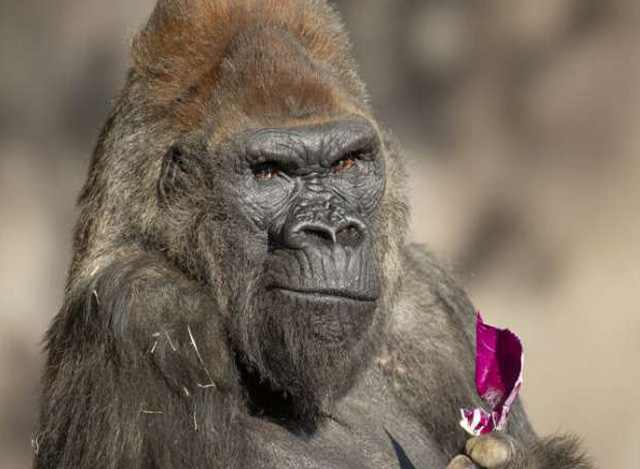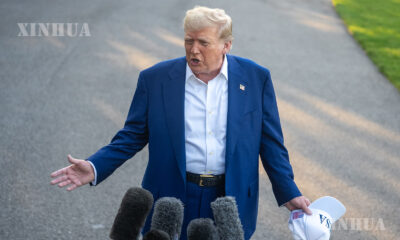WORLD
အမေရိကန်နိုင်ငံ တိရစ္ဆာန်ရုံရှိ ဟိုမိုနီဒယ်မျောက်ဝံမျိုးများအား တိရစ္ဆာန်များအတွက် ထုတ်လုပ်ထားသော COVID-19 ကာကွယ်ဆေး ပထမဆုံးထိုးနှံပေး

လော့စ်အိန်ဂျလိစ်၊ မတ် ၁၁ ရက် (ဆင်ဟွာ)
အမေရိကန်နိုင်ငံ ဆန်တီယေဂိုတိရစ္ဆာန်ရုံရှိ ဟိုမိုနီဒယ် မျောက်ဝံမျိုး (great ape) ၉ ကောင်အား တိရစ္ဆာန်များအတွက် ထုတ်လုပ်ထားသော COVID-19 ကာကွယ်ဆေး ထိုးနှံပေးခဲ့ပြီး အမေရိကန်တွင် လူသားမဟုတ်သော မျောက်ဝံများကို COVID-19 ကာကွယ်ဆေး ပထမဆုံးထိုးနှံပေးခြင်းလည်းဖြစ်ကြောင်း တိရစ္ဆာန်ရုံတာဝန်ရှိသူတစ်ဦးက မတ် ၉ ရက်၌ ပြောကြားခဲ့သည်။
အမေရိကန်နိုင်ငံ တိရစ္ဆာန်ဆေးဝါးကုမ္ပဏီ Zoetis က အဆိုပါ ကာကွယ်ဆေးသည် သန့်စင်သော ပရိုတိန်းဖြင့် ပေါင်းစပ်ဖော်စပ်ထားသောကာကွယ်ဆေးဖြစ်ပြီး တိရစ္ဆာန်များကို COVID-19 ဖြစ်စေသည့် SARS-CoV-2 ဗိုင်းရပ်စ်မှ ကာကွယ်ရေးအတွက် အသုံးပြုရန် ရည်ရွယ်ထားခြင်းဖြစ်ကြောင်း ဆန်တီယေဂိုတိရစ္ဆာန်ရုံရှိ အဆင့်မြင့် ပြည်သူ့ဆက်ဆံရေး အရာရှိ Darla Davis က ဆင်ဟွာနှင့် တွေ့ဆုံမေးမြန်းရာ၌ ပြောကြားခဲ့သည်။
၎င်းကာကွယ်ဆေးကို အော်ရင်ဂူတန်မျောက်ဝံ လေးကောင်နှင့် လူဝံ ငါးကောင်တို့အား ဇန်နဝါရီလမှ ဖေဖော်ဝါရီလအထိ ထိုးနှံပေးခဲ့ကြောင်း သိရသည်။
အဆိုပါ ကာကွယ်ဆေးအား လူသားမဟုတ်သူများ၌ အသုံးပြုရန်အတွက် တင်းတင်းကြပ်ကြပ် ရည်ရွယ်ဖော်စပ်ထားခြင်းဖြစ်ကြောင်း Davis က ဆိုသည်။
တိရစ္ဆာန်တစ်ကောင်စီတိုင်းသည် သီတင်းပတ်သုံးပတ်ခြားစီဖြင့် ကာကွယ်ဆေး နှစ်ကြိမ်စီထိုးနှံထားပြီး ဖြစ်ကြောင်း၊ ကာကွယ်ဆေးထိုးနှံပြီးသည့် တိရစ္ဆာန်များသည် ကောင်းမွန်လျက်ရှိသလို ကာကွယ်ဆေးကြောင့် ဆိုးကျိုးသက်ရောက်မှုများ ပြသခြင်းမရှိကြောင်း Davis က ပြောခဲ့သည်။
အဆိုပါ တိရစ္ဆာန်ရုံ၏ ဆာဖာရီဥယျာဉ်တွင် COVID-19 ဖြစ်ပွားခဲ့သော ဇန်နဝါရီလတွင် ကာကွယ်ဆေးထိုးနှံခြင်းများကို ဆောင်ရွက်ခဲ့ခြင်းဖြစ်သည်။ တိရစ္ဆာန်ရုံထိန်းသိမ်းစောင့်ရှောက်သူတစ်ဦးတွင် COVID-19 ရောဂါစစ်ဆေးတွေ့ရှိမှုကြောင့် Western lowland ဂေါ်ရီလာမျောက်ဝံ ၈ ကောင်တွင် ဗိုင်းရပ်စ်တွေ့ရှိခဲ့ဖွယ်ရှိကြောင်း သိရသည်။
ဘိုနိုဘိုအုပ်စုနှင့် အော်ရင်ဂူတန်အုပ်စုများ အပါအဝင် ဟိုမိုနီဒယ် မျောက်ဝံအချို့သည် ရောဂါကူးစက်နိုင်ခြေ အမြင့်မားဆုံး ဖြစ်ပြီး ကာကွယ်ဆေးထိုးနှံရလွယ်ကူနိုင်ကြောင်း San Diego Zoo Wildlife Alliance တိရစ္ဆာန်ဆေးကုဆရာဝန်များက သတ်မှတ်ထားကြောင်း Davis က ပြောခဲ့သည်။
ဇန်နဝါရီလက COVID-19 ကူးစက်ခံရသော ဆာဖာရီဥယျာဉ်ရှိ ဂေါ်ရီလာအုပ်စုဝင်များသည် ယခုအခါ ပြန်လည်ကျန်းမာလာပြီဖြစ်ကြောင်း၊ ၎င်းတို့မှာ SARS-CoV-2 ပါဝင်သော ကာကွယ်ဆေး ထိုးနှံထားခြင်းမရှိကြောင်းနှင့် ၎င်းတို့၏ ကိုယ်ခံအားစနစ်များမှာ ဗိုင်းရပ်စ်ပဋိပစ္စည်းများ ထွက်ပေါ်ခဲ့သည်ဟု သုတေသီများက ယူဆထားခဲ့ကြောင်း Davis က ဆင်ဟွာသို့ ပြောခဲ့သည်။
ထို့ပြင် တိရစ္ဆာန်ရုံအနေဖြင့် ကျန်ရှိသော ကာကွယ်ဆေးအနည်းငယ်ကို မတ်လအတွင်း ဂေါရီလာ အပါအဝင် မျောက်ဝံအုပ်စုများကို ထိုးနှံပေးသွားမည်ဖြစ်ကြောင်း ၎င်းက ပြောခဲ့သည်။ (Xinhua)
————————————-
(English Version)
First apes at U.S. zoo receive COVID-19 vaccine made for animals, zoo official says
Source: Xinhua| 2021-03-10 04:01:25|Editor: huaxia
LOS ANGELES, March 9 (Xinhua) — Nine great apes at the San Diego Zoo have received a COVID-19 vaccine made for animals, which were the first known non-human primates to receive a COVID-19 vaccine in the United States, a zoo official said Tuesday.
The vaccine, offered by American veterinary pharmaceutical company Zoetis, is a recombinant purified spike protein vaccine, intended for use in protecting animals against SARS-CoV-2, the virus that causes COVID-19, Darla Davis, senior public relations representative at the San Diego Zoo, told Xinhua in an interview.
The vaccine was administered to four of the orangutans and five of the bonobos starting in January, continuing through February.
The vaccine doses originated from a supply strictly intended for nonhuman use, Davis said.
Each animal received two doses, about three weeks apart. The animals that have received the vaccine are doing well and showed no adverse reactions from the vaccine, Davis said.
The vaccinations followed a January outbreak of COVID-19 at the zoo’s Safari Park. Eight western lowland gorillas got the virus, probably by exposure to a zookeeper who tested positive for COVID-19.
San Diego Zoo Wildlife Alliance veterinarians identified some of the great apes were most at risk and could be easily vaccinated, including members of the bonobo troop and orangutan troop, Davis said.
The gorilla troop at the Safari Park, who were infected with COVID-19 in January and now fully recovered, did not receive the vaccine as they were exposed to the SARS-CoV-2 virus, and zoo researchers assumed their own immune systems have developed antibodies to the virus, Davis told Xinhua.
The zoo will administer the last few vaccine doses to primates, including gorillas, in March, she said. ■
A gorilla is seen at the San Diego Zoo Safari Park, California, the United States. (Photo credit: San Diego Zoo Wildlife Alliance)






